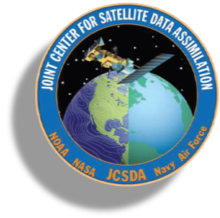When Dr. Michael Morgan opened the UIFCW Conference on July 24, 2023, he focused his remarks on not just data assimilation but the work being done with JEDI by JCSDA and partners, recognizing that work as a key part of the future of forecast models.
JCSDA’s 2023 Q1 Review Highlights Wins Across the Organization
JCSDA Announces the Fifth Public Release of Skylab
JCSDA Announces the Fourth Public Release of SKYLAB
The JCSDA is pleased to announce the release of Skylab 4.0!
JCSDA SkyLab 4.0 is the fourth roll-up release that provides integrated Earth System Data Assimilation capability via a unified end-to-end ecosystem including a single code build, workflow, data store, and diagnostics dashboard. Initial capabilities are demonstrated for the following components: atmosphere, ocean, sea-ice, soil moisture, snow, aerosols, and composition. The diagnostics dashboard is available at https://skylab.jcsda.org
The main SkyLab upgrades for release 4.0 include:
Atmosphere-land experiment:
Updated observation converters for AMV satellite wind, ATMS, and TROPICS
Correlated observation errors for IASI and CRIS
Trace gas experiment:
CO and NO2 3DVar assimilation from TropOMI NO2 tropospheric columns, TropOMI CO total columns and MOPITT CO total columns observations.
Software infrastructure
Environment to build: all libraries on SPACK-STACK 1.3.0
Observation API: significant gains in I/O efficiency with IODA v.2.5
Support is extended to the following system requirements:
Amazon Web Services (AWS) Single Node AMI (RedHat 8)
Amazon Web Services (AWS) Parallel Cluster (Ubuntu 20.04)
NASA Discover (gnu & intel)
NOAA Mississippi State University Orion (gnu & intel)
NOAA University of Wisconsin S4 (gnu & intel)
NCAR Cheyenne (gnu & intel)
SkyLab has been developed by the JCSDA with contributions from its Partner Agencies in NOAA, NASA, the US Air Force, and the US Navy.
To read more about the release, links to the code, release notes and tutorials, visit www.jcsda.org/jediskylab




